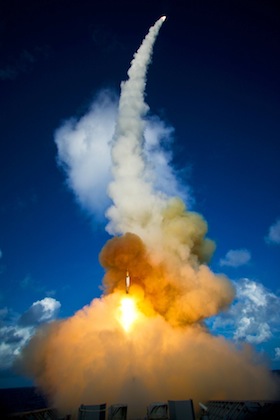Russia Actively Seeks U.S. Cooperation on Missile Defense
July 22, 2011
Featured Image
Today's top nuclear policy stories, with excerpts in bullet form.
Stories we're following today: Friday, July 22, 2011.
U.S.-Russia Joint Missile Defense? - David Ignatius in Washington Post [link]
- Senior U.S. and Russian officials met this week in Washington to discuss how joint data-fusion and operations centers would work if the two countries could hammer out an agreement to cooperate on missile-defense.
- The fact that the Russian side wanted to talk with a journalist about their discussions was unusual in itself—another small sign that the “reset” in Russian-American relations pressed by President Obama over the last two years has brought some real changes to the relationship.
- Russia wants to be a real partner in the missile-defense system ... rather than a “passive observer” watching American operations.
- For a journalist like me who grew up in the Cold War years, the idea that the two countries could someday operate joint strategic facilities—sharing top-secret radar and satellite imagery, even--is mind-bending, to say the least.
The Global Costs of Nuclear Weapons - Kelly Bronk in Ploughshares Blog [link]
- A new report from Ploughshares Fund grantee Global Zero reminds us that it’s not just the U.S. struggling with the fiscal burden of maintaining – and modernizing – an arsenal of nuclear weapons … the nuclear weapons states (U.S., Russia, China, France, United Kingdom, India, Israel, Pakistan and North Korea) will spend at least $1 trillion on nuclear weapons and their direct support systems over the next decade.
- ... current U.S. nuclear modernization plans put the nation on a path to spending more on nuclear weapons than at any point since the Cold War … In the United States, Global Zero estimates that for the cost of a single nuclear weapon, the U.S. could provide health care coverage to 36,000 low-income Americans. For the cost of another nuclear weapon: 400 college scholarships.
- During a time of global economic fiscal crisis, maintaining bloated nuclear arsenals is not only economically unsustainable, but also strategically unnecessary. The consensus among military officers and security experts from both sides of the aisle is that nuclear reductions increase American national security.
- This conversation needs to gain traction in capitols worldwide. One trillion dollars is far too much to spend on weapons that fail to make the world safer or more secure.
Tauscher on Nuclear Disarmament - Voice of America [link]
- Delegations from the United States, China, Russia, the United Kingdom, and France (known as the P-5 countries) recently gathered in Paris for the second Conference on Confidence Building Measures towards Nuclear Disarmament and Non-Proliferation … Under Secretary for Arms Control and International Security Ellen Tauscher led the U.S. delegation.
- Under Secretary Tauscher stressed that the more progress the P-5 countries make in addressing such serious non-proliferation challenges [as Iran and North Korea], the better placed the world will be for further progress on disarmament.
- "... no one nation can create the conditions that would lead to the day when nuclear weapons are obsolete," said Under Secretary Tauscher. "We need other countries to step forward with us.... [and] be as transparent and as open as we are to provide confidence for deep reductions."
Hiroshima Governor Announces Plan For World Peace, Nuclear Disarmament - Global Security Newswire [link]
- A number of former top officials from the United States and other nations have helped to develop an initiative aimed at pursuing global nuclear disarmament and world peace … timed to coincide with the 66th anniversary of the nuclear bombing of the Japanese city of Hiroshima near the end of World War II.
- "Hiroshima is a place that not only experienced total annihilation, but managed to rebuild itself from the ashes as well," Hiroshima Governor Hidehiko Yuzaki said to an audience of international journalists in Tokyo. The time has come for the city "to move forward from being a mere representation of tragedy," he added.
- "We live in a world where the threat of nuclear terrorism is real. This means that peace-building is an essential requirement for achieving the goal of abolishing nuclear weapons because of the necessity to eradicate the breeding grounds of conflict and terrorism," Yuzaki said.
North, South Korea Hold “Constructive” Talks - Michael Martina and Olivia Rondonuwu in Reuters [link]
- The nuclear envoys of South and North Korea held talks in a cordial atmosphere in Indonesia on Friday, and said they would work to resume the stalled six-party dialogue for nuclear disarmament on the Korean peninsula.
- "We agreed to continue to make joint efforts in the process of negotiations for denuclearization," South Korean nuclear envoy Wi Sung-lac told reporters … "We agreed to make joint efforts to set conditions to resume the six-party talks as soon as possible. I had very constructive and useful conversations with my counterpart."
- Ri Yong-ho, North Korea's vice foreign minister who handles nuclear diplomacy, was smiling as he said: "(We) met as part of efforts to resume six-party talks as soon as possible."

